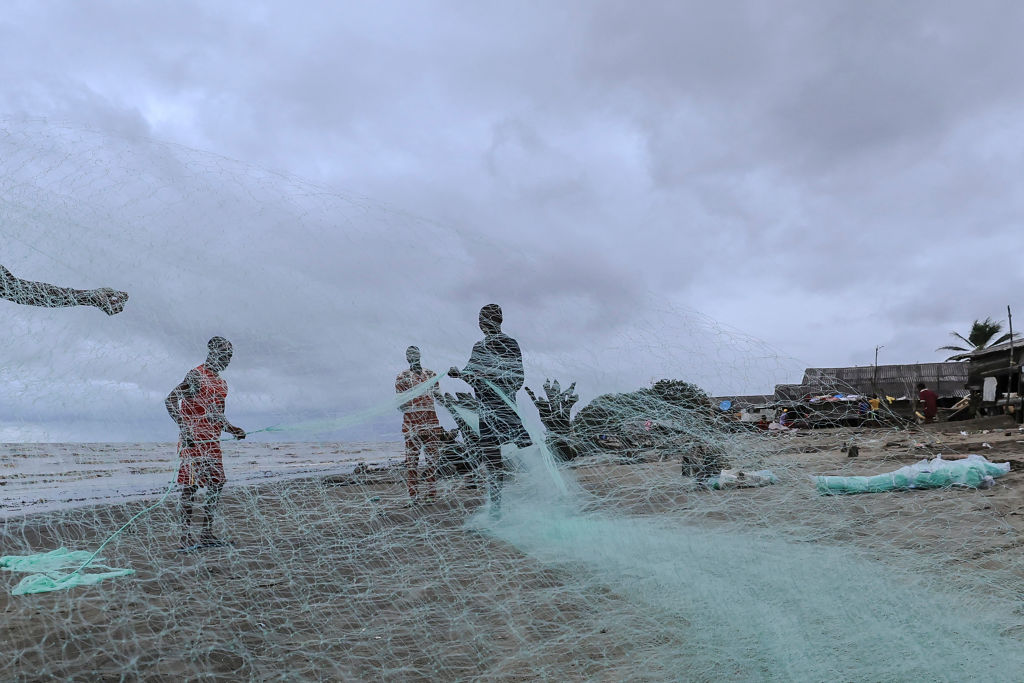Artisanal fishermen in Cameroon’s Douala-Edéa National Park are decrying Chinese trawlers that destroy their fishing gear, fish in prohibited zones, and use illicit nets and chemicals to catch fish.
A fisherman in Mbiako, a fishing town of about 3,000 people along the Sanaga River basin, said three local fishermen were shot in 2024 amid confrontations with the industrial trawlers, which access the park from the Gulf of Guinea via the Sanaga River. They fish on Lake Tissongo and in the park’s mangrove swamps and coastal waters.
“The trawlers’ army pursues us with guns at sea,” the fisherman anonymously told the Global Voices news outlet. “Occasionally, they spot us and purposefully destroy and cut our nets with the catch. They shoot if we chase them to retrieve the nets.”
These practices are common among Chinese trawlers operating in West Africa, the world’s epicenter for illegal, unreported and unregulated (IUU) fishing. According to the IUU Fishing Risk Index, China is the world’s worst illegal fishing offender. West Africa loses an estimated $10 billion annually to IUU fishing, while Cameroon’s government estimates that the country loses about $33 million annually to the scourge.
The protected area Douala-Edéa park is along the Atlantic coast on both sides of the mouth of the Sanaga River. Within the park and elsewhere, Chinese trawlers commonly use modified nets with illegal mesh sizes that result in the widespread catch of undersized and juvenile fish, which prevents them from reaching maturity and reproducing.
This reduces fish populations, making it difficult for local fishermen to make a living, the Environmental Justice Foundation (EJF) reported. Catching undersized and juvenile fish is prohibited under Cameroonian law.
“Catching juveniles before they reach reproductive age poses a serious threat to fish populations and risks undermining the future of Cameroon’s fisheries, raising concerns for the population’s food security in a country that remains heavily reliant on imports to satisfy domestic demand for fish,” the EJF reported.
This depletes protein sources in a country where nearly 250,000 face severe or elevated food insecurity.
Fishing nets are a prized commodity among fishermen in the Douala-Edéa park, and replacing them is a substantial financial burden. Patrick Ngoye, a fisherman in Mbiako, told Global Voices that his nets have been destroyed five times this year. Fumelayo Eneola, women’s president of the Mbiako Market, one of Cameroon’s largest markets, said artisanal fishermen often are forced to take out loans to buy new fishing kits.
“Our husbands (fishermen) are entangled in a spiral of debt as they borrow from market women to buy the kits which the trawlers destroy often,” Eneola told the news outlet.
Last year, Cameroon’s Ministry of Forestry and Wildlife established guidelines for local communities to be involved in the planning and decision-making for protected area management, Global Voices reported. The EJF has supported the government in establishing Local Collaborative Management Committees (LCMCs) to ensure that locals’ concerns are included in management plans.
The LCMCs mediate between communities and the government, monitor illegal practices and lead sustainable development initiatives. The EJF provides technical guidance for participatory fisheries governance, empowering small-scale fishing communities — including Mbiako and Yoyo I and Yoyo II, also in Douala-Edéa park — in the battle against IUU fishing.
The LCMCs design and implement management plans and maintain and participate in the surveillance of the protected area boundaries, among other things.
Mvondo Kenneth, conservator of Douala-Edéa park, said community and government buy-in will be essential to the success of the LMCSs.
“The newly installed committee has the total support of the conservation officer to guarantee sustainable forest and sea management,” Kenneth said in the Global Voices report. “To conserve and manage resources effectively, the committee will be at the forefront of conservation services.”
Magmaen Loius Fils, LCMC president for Yoyo, said the collaboration should be honest and straightforward.
“With the contribution of NGOs and the government, there would be a change, especially regarding the trawler phenomenon,” Fils said in the report.
The EJF has worked with Cameroon to fight illegal fishing since 2022. The foundation in late 2023 introduced the Dase Cameroon app, a smartphone application developed and maintained by the EJF that enables users to capture video or photo evidence of IUU fishing in real time, regardless of internet connection. The foundation provided training on the use and protection of the app before making it available to fishermen.
“The knowledge and experience will help us report trawler incursions and help protect our main source of livelihood as well as our fishing equipment,” Orimisan Omoruy, head of the Mbiako fishermen’s organization, said on the EJF’s website.

